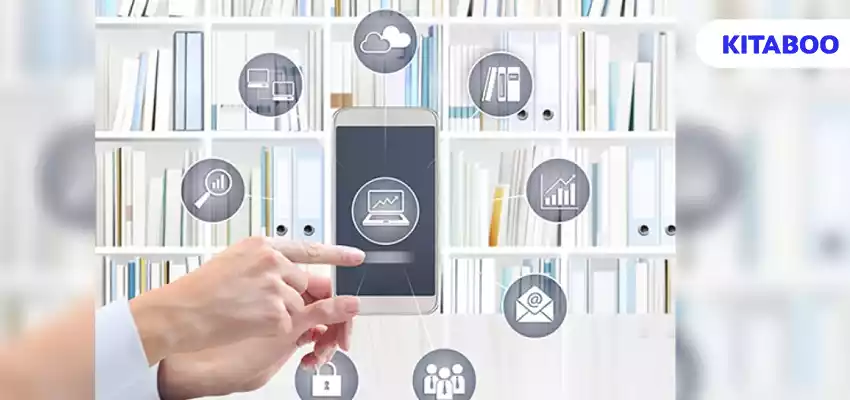
Pros of a Digital Library for Associations & Non-Profit Organizations
A digital library, also commonly called an electronic library, is a vast repository of documents and files in categorized digital form, available over the web or on hardware storage devices like memory disks, flash drives, etc. In these libraries, the access, preservation, and propagation of information take place in the digital form.
Depending on the kind of library to be accessed, a user can have videos and audio files, soft-copies of documents, images, e-magazines, and more as the constituents of a digital library.
Digital libraries are the result of the commingling of several disciplines, including data management, document management, library science, image processing, information systems, AI, and human-computer interaction.
Because of these technological disruptions, several existing libraries are being reconstructed as digital libraries, which provide abundant information to help fulfill a users’ fundamental objective of learning about a subject.
This is all a direct result of the pace of the globalization of information today and the unprecedented rate of its dissemination.
With each day, geographical limitations are being transcended due to the continual evolution of Information and Communication Technology (ICT) systems, with the current restrictions of time and space slowly becoming negligible as well.
This has caused a paradigm shift with regard to the concept of information centers. We are slowly moving away from the traditional method of organizing, retrieving, and preserving documents in print to the adoption of ICT. This has brought about a sea of change in the process of collection development, their organization, and accessibility, and organizations are increasingly trying to capitalize on this development for business purposes.
6 Reasons Why All Non-Profit Associations Need a Digital Library
As the market turns more and more competitive, organizations are proactively releasing digital libraries to train their employees in their core values and USPs and achieve uniqueness as a brand. However, even in spite of being aware of its benefits, organizations refrain from digitalizing their processes, based on some ill-founded notions of security and transparency issues.
These organizations, which are more often than not nonprofit associations, still store their sensitive data in the form of hard copies. These associations have vast amounts of community data that include meeting details, reports of finance, annual records, articles of incorporation, etc. which can be lost or misplaced easily.
Fortunately, this attitude of nonprofits is slowly taking a turn for the better, and many have started espousing the idea of creating a digital archive of their current data. Creating a digital library where all documents, old and new, are located in a centralized location will help you manage all your current and future data needs seamlessly.
To that end, we will take a look at the importance of a digital library today and how nonprofit associations can benefit from having one.
1. Maintain a Database of Records
Nonprofits have tremendous amounts of sensitive data exclusive to member communities, financial information, and more. Creating a digital library will alleviate your woes of mistakenly misplacing these files or losing them.
It will also provide your members with a ready way to access the stored files from a database. This can promote higher productivity, too, by doing away with the laborious process of searching for physical files over and over again.
2. It Makes Information Easily Accessible to All
Once your data is secured in a private database, the ease of accessing information from it multiplies intemperately. Say, if you want to find a file to refer to some information, you only have to search for it to access it.
3. It Increases Data Security
Anything that has a physical form is always susceptible to damage. Even if you were to store your paperwork safely, the lifespan of the paper itself isn’t much, and the quality starts to deteriorate over longer spells, making essential data obscure at times.
By creating a digital library, you can store all your sensitive data in the cloud. With this, you can access your records even if your hardware no longer works or is destroyed in an accident.
4. It Is Cost-Effective
Storing your records digitally helps you do away with the costs related to materials, maintenance, and safekeeping of them. By archiving all your data, you will no longer have to worry about these issues as it would be a one-time investment. After your data has been digitalized and stored online, you can continue without worrying about maintaining it.
5. It Frees Up Space
This one’s an obvious benefit and is in keeping with the previous point. You can do away with those colossal filing cabinets by storing all your data centrally in a digital library for easy use and access.
All your data can be saved on a server. This lets you do away with the worry of using up all of your drive space too.
6. It Saves You Time
How to Create a Digital Library for Non-Profit Associations?
The development and construction of a digital library are heavily dependent upon its technological environment provided by the internet and the world wide web. The World Wide Web provides the requisite tools and technologies for disseminating information while the internet supplies the TCP/IP and/or related protocols for gaining access to the information.
The necessary tools required for a digital library are:
Computer: PCs, servers, UPS, etc.
Software: Any appropriate software that is interlinked and suitable for LAN/WAN connections.
Network: The internet, WAN, LAN, MAN, etc.
Storage Devices: CD-ROMs, optical storage devices, etc.
Scanner: Bar code scanner, sheet feeder, Drum Scanner, Microfilm Scanner, digital camera, Slide Scanner, etc.
Printer: Dot matrix printer, laser printer, digital graphic printer, etc.
Audio Visual: Color TV, smartphones, tablets, laptops, sound boxes, etc.
Any substance, whether existing in print or electronic/digital form, that can be preserved, categorized, transferred, and broadcasted by a computer without the need for any conversion process is a digital library resource.
Primarily, there are two types of resources:
Online Resources
- E-books, maps, images, audio files, video files, vlogs, electronic text, multimedia files, etc.
- Electronic journals
- Locally accessible database of books in machine-readable form
- Active network for browsing the web, e-mail, etc.
- Trained resources for online help
Offline Resources
- Audio-visual aids, etc.
- CD-ROM.
Instructions for Digital Library Design
A digital library’s main aim is to serve communities, and these are usually created by the people and for the people. Any and all attempts to design, deploy, and assess digital libraries must stem from the information and educational needs, ethos, and contexts of the persons who will use these libraries or for whom these libraries are built.
3 Guidelines for the Creation of a Digital Library -
1. Recognize Who Your Users Are
Ask yourself who are you creating the archive for. This will help you arrive at the way you should archive the order so that it is comprehensible, easy to operate and find, and customized to people from different departments.
2. Come Up with the Correct Metadata
Come up with the right metadata. Metadata is nothing but a digital tagging of your files. It will make the content easily accessible and searchable. Tag files correctly while archiving them by coming up with accurate metadata for each so that similar files aren’t confused by the system.
3. Reach Out to the Right Vendor
If you don’t have the required manpower to take up the job of archiving your files by converting them into a digital form, it is better to outsource the job. Get in touch with a business that provides digital library and archiving solutions with expertise in digitization and scanning. Examine their past work and decide upon the one that best matches your needs.
Final Word
As technological systems continue to advance, there will be a massive expansion in digital library services and activities. It won’t be long before companies recognize the need for digital libraries and deploy departments and programs in the digital library sphere. These libraries will capitalize upon developments in the information & data management area.
Digital libraries are here to stay and provide a lot of scope to organizations to build upon their digital transformation efforts by keeping everyone abreast of the latest market developments. It is also soon going to become part of day-to-day professional activity in the next few years or so.
If your organization hasn’t adopted a digital library yet, it is high time you did so if you don’t want to miss out on the Fourth Industrial Revolution.
Contact our expert team now and get started!
To know more, please write to us at contact@kitaboo.com
Related:
- 6 Reasons Why Associations & Nonprofits Need a Digital Archive
- 5 Point Guide to Publishing a Research Paper in a STEM Journal
- How Can Associations Distribute e-Reports Effectively?
- How Can Societies Digitize Publishing and Delivery Process
- 7 Highly Effective Guidelines to Create an e-Report for Associations
- Why Should Societies & Associations Publish & Distribute Journals on Digital Platforms?
- 8 Ways to Keep Members of Societies Engaged in the Digital Era
- Corporate Training Apps
- What are Summative Assessments
- White Label Branded E-Book Reader App
Discover how a mobile-first training platform can help your organization.
KITABOO is a cloud-based platform to create, deliver & track mobile-first interactive training content.



